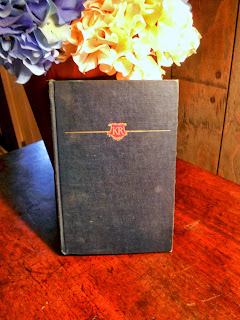First Printing: 1996 by Dutton
Illustrations by Jaye Zimet
Map by Virginia Norey
Cover Artist: Unknown
I'm back after a week off for Christmas! I took the time away to finish the companion to Desperation by Stephen King. Like it's partner, The Regulators was not lacking in scare factor. It kept me on the edge of my seat wondering who would live and who would die. Unlike Desperation, however, The Regulators had some major pitfalls that were laying right out in the open.
The Regulators is set in Wentworth, Ohio. On a sunny day in midsummer, the residents of Poplar street are out enjoying themselves. Kids run around outside, neighbors wash their cars, and writer Johnny Marinville is playing his guitar on the front stoop. It's a day as lovely as any other, until a space-age red van pulls onto the street. The neighborhood paperboy goes down in a hail of gunfire, and from then on Poplar street is a war-between the neighbors and a gang of futuristic vans driven by ghostly characters.
The foul god Tak is back, and this time he's in control of an autistic little boy named Seth. Tak realizes all of Seth's fantasies by bringing the characters from his favorite TV shows to life. These happen to be shoot 'em up cowboys from old westerns, and a gang of super heroes called the MotoKops. But Tak turns these characters into his own evil cohorts, and he sets them loose on Seth's family and neighbors. The Motokops tear down Poplar Street in their power wagons, taking the cowboys along for the ride. They mow down anyone in their path with shotguns, and the neighbors must band together to escape being killed by these fantasy fiends.
Final Rating: 2.5 out of 5
This book was not lacking in the horror department. It's violent attention to detail was disturbing, and the twisted childhood fantasies were frightening enough to give me one of those "I don't want to keep going, but I can't look away" feelings. However, I kept getting distracted by shaky sentences and grammatical errors. Here's a grand example:
"... David Carver with tendrils of blood running down his white, blubbery sides in tendrils." (page 82)
Yikes.
And if any of these character names look familiar, it's because Stephen King reused them for this book. It's not a true sequel, it's more of an alternate timeline. Personally, I wasn't a huge fan of that. I would have preferred a continuation of Desperation, or a prequel of some sort. All in all, this book felt like something slapped together at the last minute. I won't be returning to it anytime soon.
Favorite Quote:
"Dave took the shells and opened the box while his brother rolled the .45's cylinder and held the gun up to the light, checking to make sure the chambers were empty just as Johnny had done. We're careful because we understand the potential a gun has to maim and kill, Johnny thought, but it's more than that. On some level we know they're evil. Devilish. Even their biggest fans and partisans sense it." (page 240)
The Regulators is available in physical and digital copies from all major booksellers, including Barnes and Noble and Amazon.



























